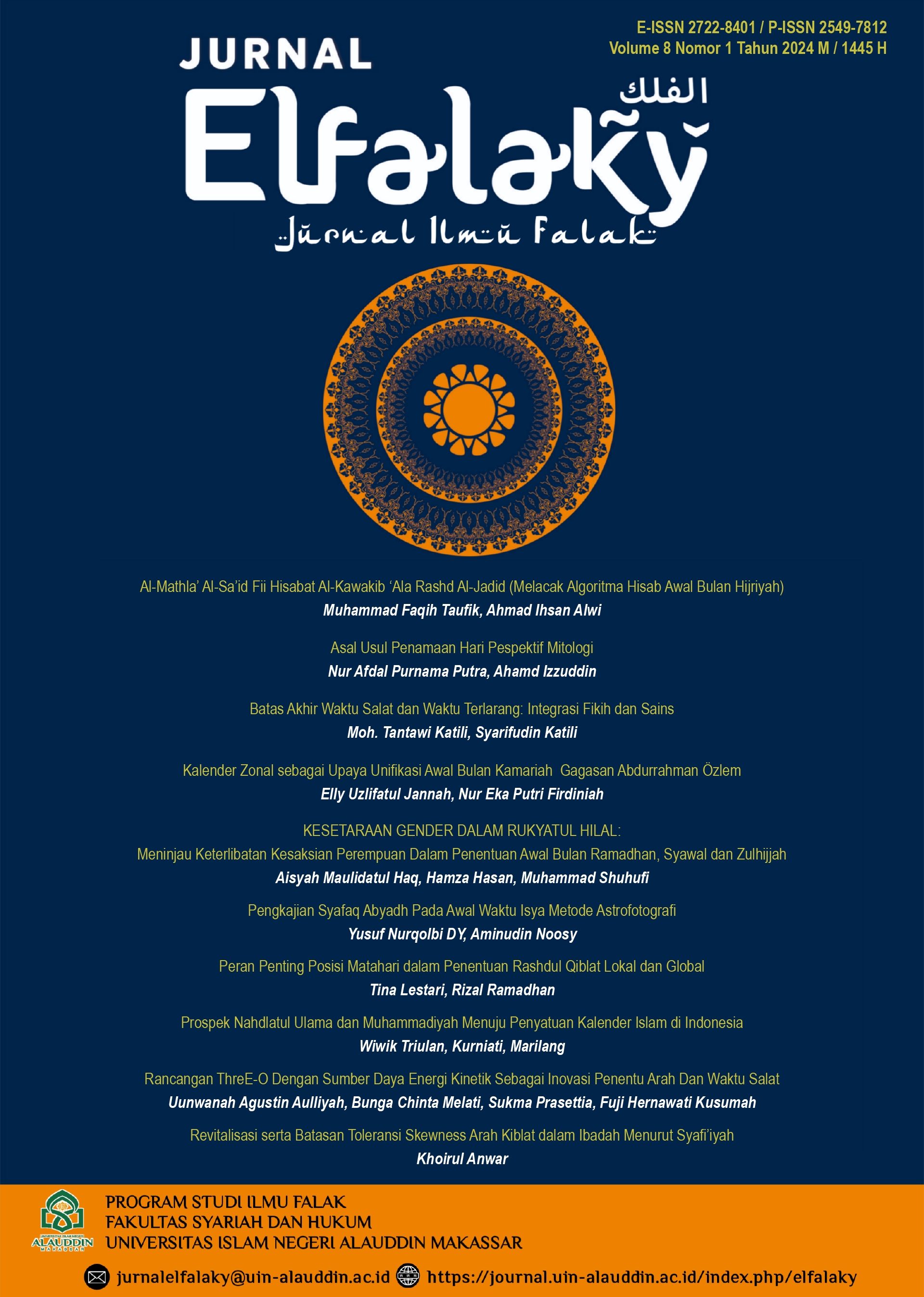Asal Usul Penamaan Hari Perspektif Mitologi
Keywords:
Origins, Naming Days, Mythology
Abstract
A calendar is a marking instrument that makes it easier for someone to mark days and seasons. In the calendar cycle used today, it is agreed that there are 7 days in a week, namely Monday to Sunday, which then raises the question of where the name of these days came from and why they are called that. To answer this, a qualitative research study will be carried out which is library research. This article tries to answer why there are seven days in a week and where the names of the days come from from a mythological perspective so that we will find answers to the history of the origins of the naming of days from a mythological perspective because ancient nations were very steeped in their myths.
References
Arisafitri, Novi, and Ahmad Izzuddin. “Sistem Penanggalan Suku Nias Perspektif Ilmu Falak Dan Astronomi.” AL - AFAQ : Jurnal Ilmu Falak Dan Astronomi. Vol. 3, No. 2. 2022.
Ayu, Faradina. “Asal-Usul Tujuh Hari Dalam Seminggu.” Kemenkes: Mediakom.Kemenkes. go.id. Kementerian Kesehatan RI, 2020. https://mediakom.kemkes.go.id/2020/08/asal-usul-tujuh-hari-dalam-seminggu/#:~:text=Penetapan satu minggu terdiri dari,Mars%2C Jupiter%2C dan Saturnus.
Azhari, Susiknan. Ensiklopedi Hisab Rukyat. Cet II. Yogyakarta: Pustaka Pelajar, 2008.
Butar, Arwin Juli Rakhmadi Butar. Kalender : Sejarah Dan Arti Pentingnya Dalam Kehidupan. Cet. I. Semarang: CV. Bisnis Mulia Konsultama, 2014.
———. Kalender & Sistem Waktu Dalam Islam. Medan: Umsu Press, 2021.
Coolman, Robert. “Origins of the Days of the Week.” Live Science, 2014. https://www.livescience.com/45432-days-of-the-week.html.
Couzen, Reginald C. The Stories of the Months and Days. American: Frederick A. Stokes, 1924.
Falk, Michael. “Astronomical Names for the Days of the Week.” Journal of the Royal Astronomical Society of Canada, 1999.
Grant, Ember. “Mythology for Every Day of the Week.” Llewellyn: New Worlds of Body, Mind & Spirit Since 1901, 2021. https://www.llewellyn.com/journal/article/2884.
Heryati. Pengantar Ilmu Sejarah. Universitas Muhammadiyah Palembang: Program Studi Pendidikan Sejarah Fakultas Keguruan dan Ilmu Pendidikan, 2017.
Lukyani, Lulu. “Kenapa Dalam Seminggu Ada Tujuh Hari?” Kompas.com, 2023. https://www.kompas.com/sains/read/2023/01/02/170000123/kenapa-dalam-seminggu-ada-7-hari-.
Maksum, Ahmad. “Interpretasi Sejarah Sebagai Peristiwa Dan Masalah Pendidikan.” At-Turats. Vol. 9, No. 2, 2015.
Noviyanti, Dwi. “Legenda Asal Usul Nama-Nama Desa Di Kecamatan Kemangkon Kabupaten Purbalingga.” Sutasoma : Jurnal Sastra Jawa. Vol. 7, No. 1, 2019.
Rulianto, Rulianto. “Pendidikan Sejarah Sebagai Penguat Pendidikan Karakter.” Jurnal Ilmiah Ilmu Sosial. Vol. 4, No. 2, 2019.
Safitri, Bella, and Debi Setiawati. “Kontribusi Peradaban Bangsa Babilonia Dalam Perkembangan Budaya Pada Abad 21.” Dewaruci: Jurnal Sejarah Dan Pengajarannya, 2022.
Scholarly Community Encyclopedia. “Names of the Days of the Week,” 2022. https://encyclopedia.pub/entry/32293.
Setiawan, Hari. “Hari Ahad Dalam Pandangan Islam Dan Kristen.” ANWARUL, 2023. Vol. 3, No. 5, 2023.
Sitomurang, Jonar T.H. Mitologi Yunani. Yogyakarta: PBMR ANDI, 2020.
Susantio, Djulianto. “ASTROLOGI SEBAGAI ILMU BANTU EPIGRAFI: SEBUAH PEMIKIRAN.” Berkala Arkeologi. Vol. 34, No. 1, 2014.
Vinkingeskibs Museet. “The Names Of The Days Of The Week – Origin and Meaning, https://www.vikingeskibsmuseet.dk/en/professions/education/viking-age-people/the-names-of-the-weekdays.
Ayu, Faradina. “Asal-Usul Tujuh Hari Dalam Seminggu.” Kemenkes: Mediakom.Kemenkes. go.id. Kementerian Kesehatan RI, 2020. https://mediakom.kemkes.go.id/2020/08/asal-usul-tujuh-hari-dalam-seminggu/#:~:text=Penetapan satu minggu terdiri dari,Mars%2C Jupiter%2C dan Saturnus.
Azhari, Susiknan. Ensiklopedi Hisab Rukyat. Cet II. Yogyakarta: Pustaka Pelajar, 2008.
Butar, Arwin Juli Rakhmadi Butar. Kalender : Sejarah Dan Arti Pentingnya Dalam Kehidupan. Cet. I. Semarang: CV. Bisnis Mulia Konsultama, 2014.
———. Kalender & Sistem Waktu Dalam Islam. Medan: Umsu Press, 2021.
Coolman, Robert. “Origins of the Days of the Week.” Live Science, 2014. https://www.livescience.com/45432-days-of-the-week.html.
Couzen, Reginald C. The Stories of the Months and Days. American: Frederick A. Stokes, 1924.
Falk, Michael. “Astronomical Names for the Days of the Week.” Journal of the Royal Astronomical Society of Canada, 1999.
Grant, Ember. “Mythology for Every Day of the Week.” Llewellyn: New Worlds of Body, Mind & Spirit Since 1901, 2021. https://www.llewellyn.com/journal/article/2884.
Heryati. Pengantar Ilmu Sejarah. Universitas Muhammadiyah Palembang: Program Studi Pendidikan Sejarah Fakultas Keguruan dan Ilmu Pendidikan, 2017.
Lukyani, Lulu. “Kenapa Dalam Seminggu Ada Tujuh Hari?” Kompas.com, 2023. https://www.kompas.com/sains/read/2023/01/02/170000123/kenapa-dalam-seminggu-ada-7-hari-.
Maksum, Ahmad. “Interpretasi Sejarah Sebagai Peristiwa Dan Masalah Pendidikan.” At-Turats. Vol. 9, No. 2, 2015.
Noviyanti, Dwi. “Legenda Asal Usul Nama-Nama Desa Di Kecamatan Kemangkon Kabupaten Purbalingga.” Sutasoma : Jurnal Sastra Jawa. Vol. 7, No. 1, 2019.
Rulianto, Rulianto. “Pendidikan Sejarah Sebagai Penguat Pendidikan Karakter.” Jurnal Ilmiah Ilmu Sosial. Vol. 4, No. 2, 2019.
Safitri, Bella, and Debi Setiawati. “Kontribusi Peradaban Bangsa Babilonia Dalam Perkembangan Budaya Pada Abad 21.” Dewaruci: Jurnal Sejarah Dan Pengajarannya, 2022.
Scholarly Community Encyclopedia. “Names of the Days of the Week,” 2022. https://encyclopedia.pub/entry/32293.
Setiawan, Hari. “Hari Ahad Dalam Pandangan Islam Dan Kristen.” ANWARUL, 2023. Vol. 3, No. 5, 2023.
Sitomurang, Jonar T.H. Mitologi Yunani. Yogyakarta: PBMR ANDI, 2020.
Susantio, Djulianto. “ASTROLOGI SEBAGAI ILMU BANTU EPIGRAFI: SEBUAH PEMIKIRAN.” Berkala Arkeologi. Vol. 34, No. 1, 2014.
Vinkingeskibs Museet. “The Names Of The Days Of The Week – Origin and Meaning, https://www.vikingeskibsmuseet.dk/en/professions/education/viking-age-people/the-names-of-the-weekdays.

Published
2024-06-29
Section
Artikel




